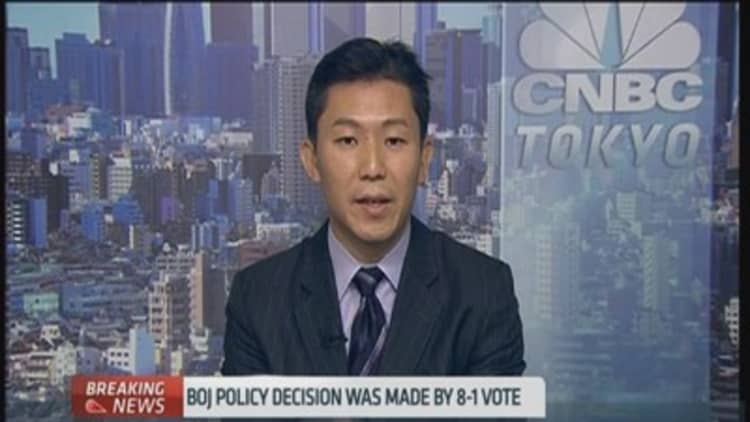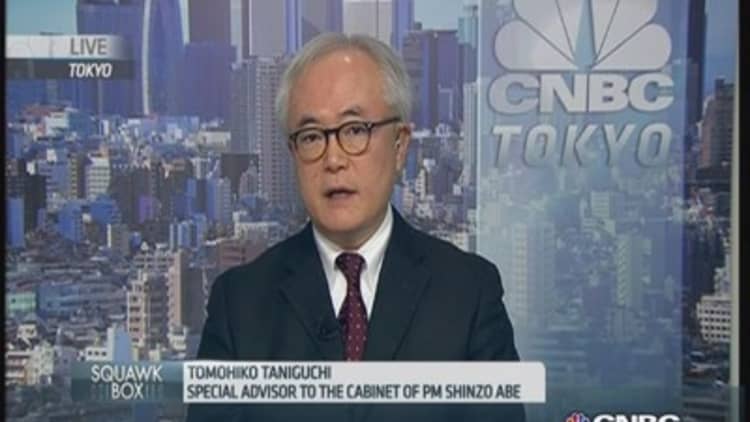It's been two years since Japanese Prime Minister Shinzo Abe swept to power on his promise to bring the stricken economy back to life through his three-pillar strategy dubbed 'Abenomics.'
But how far has Abe gotten with his bold policy experiment featuring aggressive monetary easing, fiscal stimulus and structural reforms?
Progress has been made on three main fronts, according to Naohiko Baba, chief economist for Japan at Goldman Sachs: the Bank of Japan's (BOJ) effective monetization of government debt, a positive reaction in financial markets and an invigorated job market.
The BOJ launched an unprecedented easing program in April 2013, and has been buying the lion's share of newly issued Japanese government bonds (JGBs) to enable the government to spur demand via fiscal stimulus.

The central bank's easing has been a major catalyst for financial markets. The benchmark rallied more than 40 percent since April last year, while the yen has weakened over 25 percent against the U.S. dollar over this period.
"We think it is safe to say that this strategy has generated more than the intended effect in this regard," Baba wrote in a note on Friday, referring to the reaction of financial markets to the BOJ's monetary stimulus.
Perhaps the biggest beneficiary of Abenomics has been employment, said Baba, highlighting that the job openings-to-applicants ratio has risen to roughly 1.1, higher than the pre-global financial crisis peak in 2006-2007.
But Baba notes that while employment is strong, the same cannot be said about incomes.
Read MoreWith fresh mandate, can Abe deliver on third arrow?
Real wages have been shrinking, failing to keep pace with the inflation brought about by April's sales tax hike to 8 percent from 5 percent.
Base wages - pay excluding bonuses and overtime - rose 0.5 percent on year in September, up from a 0.2 percent rise in the previous month. Once inflation is taken into account, however, wages fell 2.9 percent on year.
Work in progress
A rise in wages and upturn in exports hold the key to unlocking the success of Abenomics, said Baba, who expects progress on both fronts next year.
"The past two years tell us that yen weakness and stock market rallies alone are insufficient to spur household and corporate economic activity in a sustainable manner," Baba said.
Exports will improve gradually on drivers such as the U.S. economic recovery, he said, noting that overseas demand is a far more important determinant for exports than foreign exchange rates.
Meanwhile, real incomes will get a boost next year as the inflationary effects of the consumption tax hike drop out of the picture.
"The Abe administration has also signaled it will intervene strongly in spring wage negotiations again next year, emboldened by its December election win," Baba said.

But, productivity needs to improve continually for wages to keep rising. The government needs to deliver tangibles from its growth strategy, including far-reaching measures to address Japan's demographic challenges, he said.
Two key decisions
Takuji Aida, chief economist at , who believes Abenomics is making progress despite downward pressure on the economy from the consumption tax, says there are two policy decisions that could further help in the fight against deflation: another stimulus package and a corporate tax cut.
The package, likely to be around 3.5 trillion yen ($30 billion), is expected to be decided on by Abe's cabinet on December 27.
Alongside the economic stimulus package, the government will decide on whether it will go ahead with corporate tax cuts early next year.
It is expected to lower the tax rate, which is one of the highest among major economies at more than 35 percent, by 2.5 percentage points next fiscal year.
Abe has plans to lower the corporate tax rate over several years to around 20 percent.


